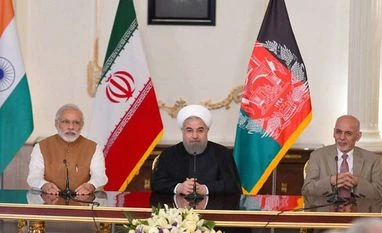On Monday, during Prime Minister Narendra Modi's ongoing visit, India signed a commercial contract with Iran to develop and operate its strategic Chabahar port.
The two nations had in 2003 agreed to develop Chabahar on the Gulf of Oman outside the Strait of Hormuz, near Iran's border with Pakistan.
Situated on the Makran Coast of the Sistan and Baluchestan province of Iran, Chabahar will also serve as a trans-shipment and logistics hub for the region.
Aside from the agreement to develop the first phase of Chabahar, the other agreement India is party to is a trilateral transport and transit agreement involving Iran and Afghanistan. Chabahar will play a vital role in the second agreement too.
The renewed focus on the long-delayed project comes at a crucial time, with China moving ahead with the China–Pakistan Economic Corridor and Iran's economic re-engagement with the rest of the world after the lifting of global sanctions following its decision to shut down its nuclear weapons programme.
Phase-1 investment
Also Read
The Chabahar free-trade zone, according to a senior official from the Chabahar port authority in Iran, has been set up on 50 hectares of land.
According to Gopal Baglay, joint secretary (Pakistan-Afghanistan-India) in the Ministry of External Affairs, Indian Ports Global Pvt will develop two terminals and five multi-cargo berths in Phase-1 under the contract signed with Arya Bandar Company of Iran. India Ports Global is promoted by the Jawaharlal Nehru Port Trust and Kandla Port Trust – two major ports working under the Ministry of Shipping.
As part of a memorandum of understanding (MoU) signed in 2015, India will equip and operate two berths on a 10-year lease in Chabahar Port Phase-1 with capital investment of $85.21 million and annual revenue expenditure of $22.95 million.
Ownership of equipment will be transferred to the Iranian side on completion of 10 years or for an extended period, based on mutual agreement. According to the MoU, operation of the two berths will commence within a period of maximum 18 months after the signing of the contract.
Additionally, an agreement for a $150 million line of credit, from the Exim Bank, for the development of the port will also be signed during PM Modi’s current visit, Baglay said.
The Union Cabinet, according to a government release, had in February this year given its nod to the proposal of the Ministry of Shipping for provision and operationalisation of a line of credit for the development of the port.
Indian investment in Phase-1 of the project would be in excess of $200 million.
Alternative land-sea route
Chabahar's importance lies in the fact that an over-land route for Indian goods to Afghanistan or the Central Asian Republics and beyond would require an agreement with Pakistan.
Located just over 70 kilometres from Gwadar port, the Chinese built and operated port in Pakistan's Balochistan province, Chabahar will allow India to circumvent Pakistan and open up an alternative land-sea route for trade with Afghanistan.
Gateway to Russia and Europe
Furthermore, Chabahar is also expected to boost the International North South Transport Corridor (INSTC), a geostrategic initiative being pushed by India to connect with Central Asia and Russia.
The roughly 5,600 kilometre-long INSTC is a proposed multi-modal (ship, rail and road) transportation system connecting the Indian Ocean and Persian Gulf to the Caspian Sea via the Islamic Republic of Iran, from where it connects St Petersburg, Russia, and North Europe.
INSTC is expected to slash time for transportation of cargo to Russia from India by half to about 30 days.
The Union Cabinet in March this year gave its approval for India to sign to the Ashgabat Agreement.
Accession to the Agreement enables India to utilise this existing transport and transit corridor to facilitate trade and commercial interaction with the Eurasian region.
Lifeline for Afghanistan
Chabahar will also boost trade and connectivity for the land-locked country of Afghanistan.
From the Chabahar port, the existing Iranian road network can link up to Zaranj in Afghanistan, about 883 kilometres from the port. The Zaranj-Delaram road constructed by India in 2009 can give access to Afghanistan's garland highway, thereby establishing road access to four major cities — Afghanistan-Herat, Kandahar, Kabul and Mazar-e-Sharif.
Additionally, Road Transport, Highways and Shipping Minister Nitin Gadkari has said that railways public sector unit IRCON will build a rail line at Chabahar to move goods all the way up to Afghanistan.
)